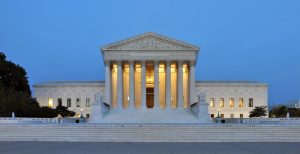Supreme Court reduces EPA’s power, but West Virginia climate activists say the fight’s not over
The beauty of the mountains of West Virginia can’t hide the ugliness of the court fight over the land below.
July 28, 2022
In the June 30 ruling on West Virginia v. Environmental Protection Agency, the Supreme Court of the United States leaned on the Major Questions Doctrine to determine the EPA cannot order power companies to use cleaner energy sources to reduce greenhouse gasses.
The Major Questions Doctrine states that a government agency cannot regulate something if Congress has not explicitly given it that specific power and it relates to major economic or political significance. This ruling benefits fossil fuel and coal companies and high-polluting businesses.
West Virginia Attorney General Patrick Morrisey is focused on the ruling’s implications for legal authority in general, rather than the effects on climate change, in particular. To him, because the EPA is an unelected body of bureaucrats, they shouldn’t have powers that Congress didn’t explicitly appoint to them, that these decisions should be left in the hands of Congress.
“This is about maintaining the separation of powers, not climate change. Today, the Court made the correct decision to rein in the EPA, an unelected bureaucracy,” Morrisey said in a press release.
While this proves to be a setback in the fight to reduce emissions and mitigate climate change, maximizing coal plant efficiency is still on the table.
“It doesn’t say that the EPA can’t regulate greenhouse gasses at all,” said Morgan King from the West Virginia Climate Alliance. “It only looks at this one section of the Clean Air Act, which requires power plants to limit emissions by shifting electricity generation to cleaner energy sources.”
The Supreme Court ruling only covered a certain power exercised by the EPA. That power is called generation shifting, which requires power companies to gradually shift to cleaner forms of energy, like wind and solar, and abandon coal through regulating caps on emissions. However, this opens up the potential for further litigation of the EPA’s powers under the same reasoning.

“What’s concerning is they could now apply that precedent to future cases and it could threaten other forms of regulations that protect our water, that protect our air, and contribute to the reduction of global warming,” King said.
According to King, polluters are getting new opportunities to further reduce regulation and keep high-polluting businesses afloat.
“Fossil fuel corporations, coal and oil and gas executives are the ones that benefit the most from this decision,” King said. “The petitioners in the case were attorneys general from conservative states, along with coal corporations. This was truly a win for polluters over the public.”
According to King, this ruling sets back the fight against global warming and pollution because it means less emissions will be removed from the atmosphere, or prevented, for the foreseeable future.
In the long term, emissions have been found to have many impacts on human health, such as worsening asthma, lung conditions, leading to higher levels of heart failure, strokes, and lung cancer. Emissions have been shown to have an impact on climate change, which affects various different aspects of life and can cause extreme weather events.
“That decision represents a flagrant disregard for what the science tells us,” said Lucia Valentine from the West Virginia Environmental Council.
Power plants are the second-largest source of greenhouse gas emissions in the United States. The Court’s limiting the EPA’s power to transition into cleaner methods of generating power will be a setback for reducing emissions. According to the Environmental Integrity Project, mandating coal plants to maximize their efficiency could reduce greenhouse gas emission by 10-15 percent..
America’s Power, a coal power trade organization, offered a press release referencing their position on the ruling. To them, coal is an integral part of the power grid.
“Coal-fired power plants provide affordable and reliable electricity,” the press release said. “Therefore, we urge EPA to avoid issuing a replacement rule that causes more premature coal retirements, especially as officials are warning about the prospect of electricity shortages that threaten grid reliability in many parts of the country.”

West Virginia activists are taking action in the fight against climate change. The West Virginia Climate Alliance is advocating for Congressional action, like a budget reconciliation package that supports the shift to clean energy for small businesses and public works.
“We have an opportunity right now in Congress to pass meaningful climate legislation, so it’s more urgent than ever that we get such legislation over the line and passed before the midterms this year,” King said.
The West Virginia Environmental Council is lobbying at their State House and supporting legislation that moves toward decarbonization with solar and wind energy.
“Our state and our people have long suffered the heavy impacts of industry, particularly coal,” Valentine said.
SCOTUS Justice Elena Kagan said in her dissent that it makes sense for the EPA to interpret the law how it needs to interpret it. She disagrees with how the Major Questions Doctrine has been applied.
King said the surest way to fight these setbacks is for Congress to explicitly grant powers of regulation, like generation shifting, to the EPA, because then the Major Questions Doctrine would not apply.
“While this was a setback it’s not the only way to climate action, we’ve seen that we have an opportunity right now in Congress to pass meaningful climate legislation,” King. “So, it’s more urgent than ever.”
–July 28, 2022–
























